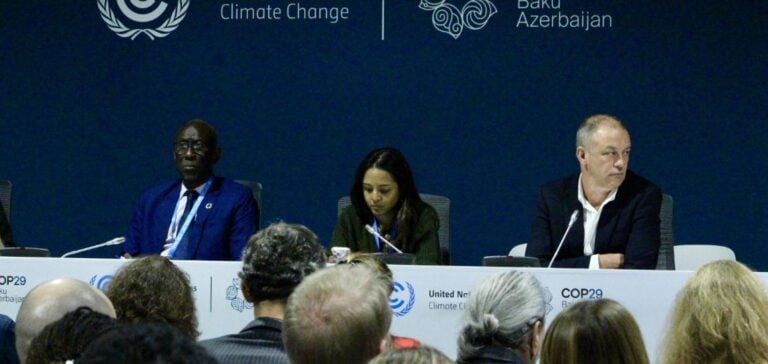The United Nations Climate Change Conference (COP29), held this year in Azerbaijan, focuses on finalizing the rules governing Article 6 of the Paris Agreement. This article is essential for international carbon credit trading, enabling companies and states to offset their emissions by financing emission reductions in other countries. The Azerbaijani presidency, seeking an early success in the first days of the conference, has insisted on the rapid adoption of guidelines for Article 6.4, the UN-led market mechanism under development.
A draft decision was released on November 11, setting standards for project methodologies and carbon removal mechanisms, a step considered significant by market observers. However, disagreements persist among participating countries. “The presidency wants it approved today, and most parties agree, but a few countries still resist,” explained a source close to the Article 6.4 negotiations.
Article 6: The Stakes of International Carbon Credit Trading
Article 6 of the Paris Agreement aims to establish a global framework for emission reduction through commercial exchanges, subdivided into two main mechanisms: Article 6.2, which allows bilateral transactions between states, and Article 6.4, a multilateral market supervised by the UN. Over the past three years, discussions around Article 6.4 have progressed slowly, hampered by concerns over environmental integrity and the robustness of project methodologies.
Recent advances on Article 6.4 have, however, spurred cautious optimism. In October, a committee overseeing this article approved standards for project methodologies, paving the way for the market to become operational. The International Emissions Trading Association (IETA) has urged negotiators to avoid further politicizing the process and to proceed swiftly with adopting these standards. This progress could limit the risks of technical blockages, the IETA notes, while acknowledging that tensions persist over the governance of the mechanism.
Article 6.4: A Carbon Market with Global Implications
Article 6.4 proposes a framework by which companies in one country can reduce their emissions locally and sell these carbon reductions to companies in other countries. This mechanism is seen as a strategic tool for nations and companies aiming to contribute to global emission reductions while benefiting from financial incentives. However, uncertainties remain regarding project approval criteria and methodology, particularly regarding carbon removal and verification of emission reductions.
Negotiations to activate this market have become increasingly delicate, with debates focusing on the validity of carbon removal methodologies and project transparency. The implementation of Article 6.4 could drive new demand for carbon credits, though sector actors remain divided over governance rules and assurances to investors.
Article 6.2: State Sovereignty vs. Investor Risks
Article 6.2 also presents sticking points, notably regarding the authorization and revocation of carbon credits. According to this article, states can authorize projects that allow the international transfer of mitigation outcomes (ITMOs, for Internationally Transferred Mitigation Outcomes), thus offering a bilateral framework for carbon credit exchanges. However, disagreements persist over the possibility for states to cancel these authorizations, a sensitive issue for investors.
Representatives from countries like Japan and Singapore, major buyers of carbon credits, express concerns over the lack of guarantees in case of potential cancellations, which pose political risks for businesses. IETA points out that parties are divided between those prioritizing national sovereignty and those calling for stricter rules to ensure investment security and environmental project integrity.
Growing Cooperation Among States on Carbon Projects
Despite uncertainties, many countries are showing increased interest in cooperation on carbon projects, as evidenced by the growing number of letters of authorization submitted under Article 6. Demand for Article 6.2 carbon credits is gradually increasing, driven by the enthusiasm of developing countries for this trading mechanism. However, the success of these projects will depend on the outcome of the ongoing discussions at COP29, with stakeholders hoping for swift rule clarification to foster a stable and attractive deployment for investors.





















